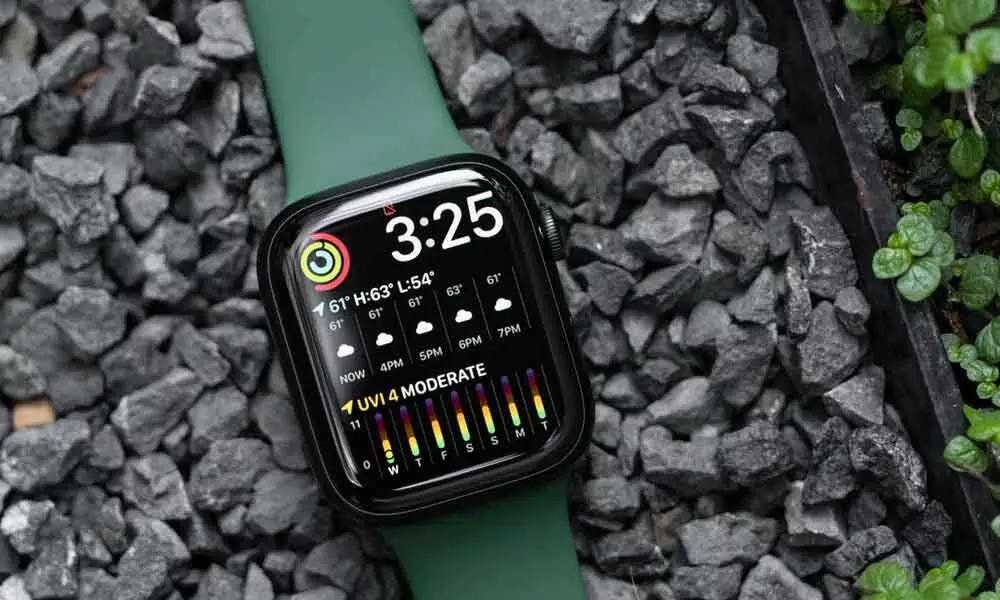Apple Watch Series 8 may not bring a body temperature sensor

Apple Watch Series 8
If you were expecting more exciting updates with the Apple Watch Series 8, you may need to start to moderate expectations. While it was initially thought that the next-gen watch would have a body temperature sensor, it looks like it won't be the case after all.
If you were expecting more exciting updates with the Apple Watch Series 8, you may need to start to moderate expectations. While it was initially thought that the next-gen watch would have a body temperature sensor, it looks like it won't be the case after all.
There has been a lot of rumour about a body temperature sensor for the Series 8 for some time now. Bloomberg's Mark Gurman, who has a good track record when it comes to Apple rumours, first hinted that a body temperature sensor was coming in June. That was quoted by The Wall Street Journal in September for a possible fertility function. Prominent Apple analyst Ming-Chi Kuo also predicted a body temperature sensor that same month. Overall, there have been several strong reasons to believe this was on the way.
However, in his latest Power On newsletter, Gurman has retracted. Speaking about the Series 8's potential for body temperature sensing, blood glucose control, and blood pressure capabilities, Gurman wrote: "Don't expect any of these soon, though. Body temperature was on this year's roadmap, but chatter about it has slowed down recently. Blood pressure is at least two to three years away, while I wouldn't be surprised if glucose monitoring doesn't land until later in the second half of the decade."
Later Gurman was seen replying to his own Tweet saying, "Never said there would be no temperature sensor - said that discussion of it has cooled down."
For blood pressure and blood glucose, this makes perfect sense. While there have been many advancements in non-invasive, cuffless blood pressure monitoring in wearable devices, the technology is simply not there yet. The same applies to blood glucose monitoring. Although the feature was rumoured for the Series 7 and on Samsung's Galaxy Watch 4, it never materialized. The technology exists in a nascent form: A prototype of the Japanese startup Quantum Operation was unveiled at CES 2021, but it is not ready for consumer devices. Of the rumoured features, body temperature sensors seemed more likely, as they are already available in several other consumer wearable devices, including those from rivals like Fitbit. In fact, body temperature sensors in wearable devices garnered a lot of attention in 2020, when researchers used them to try to determine whether smartwatches could detect COVID-19.
Currently, body temperature sensors are used primarily for sleep monitoring and recovery, although wearable fertility devices like Ava may include them as well. While Apple has added period and sleep tracking in recent years, they are simpler. Adding a body temperature sensor would potentially help improve these particular characteristics, especially if the company plans to add fertility-related features, as The Wall Street Journal reports. However, Apple is known to stick with features that other device manufacturers have already implemented until it is satisfied with its own version.
"Slow down the talk," as Gurman puts it, does not mean that a body temperature function is completely dead. However, he raises another point: It may not be realistic to expect Apple to introduce an industry-leading new innovative feature every year in its smartwatch. It is true that since Series 3, Apple has outperformed the competition when it comes to the advanced capabilities of smartwatches. Series 3 introduced cellular, Series 4 changed the design and added FDA approved EKGs, Series 5 added an always-on display, and Series 6 added a SpO2 (blood oxygen) sensor. However, the additions have been less interesting starting with Series 6. Not only have SpO2 sensors been in smartwatches since 2017, but the main function of the Series 7 was also just a larger screen.
Right now, the Apple Watch is the most popular smartwatch on the market, and Apple has a years-long lead over the competition. Wear OS watches are in the midst of a complicated transition to a new unified platform with Samsung. Fitbit and Garmin may have advanced health features and better battery life, but both lag behind in smart features like cellular connectivity. Samsung comes closer, but many of its health and fitness features aren't quite as polished. Technically speaking, there is no need for Apple at this point to drastically change things in the short term, especially since it is already investing resources in research.




